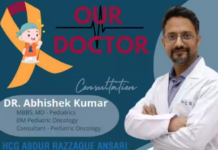Dr R V Raghunandan, Senior Consultant Radiation Oncologist, HCG MNR Cancer Centre, Ongole
Stomach cancer, also known as gastric cancer, is a serious disease that affects the lining of the stomach. One significant risk factor is the Helicobacter pylori infection, which can damage the stomach’s protective lining, leading to inflammation and cell damage. Unhealthy dietary habits, such as consuming smoked, salted, or pickled foods while neglecting fruits and vegetables, have also been linked to a higher risk of stomach cancer. Additionally, tobacco and alcohol use, family history of gastrointestinal cancers, and previous stomach surgeries for conditions like peptic ulcers may increase the risk.
It often develops silently in its early stages, making it challenging to detect. However, common symptoms may include persistent indigestion, abdominal discomfort, unexplained weight loss, loss of appetite, nausea, and vomiting. It is very crucial to understand its causes, recent progress in treatment, and prevention strategies.
Causes
Stomach cancer develops when the cells lining the stomach undergo abnormal changes, leading to the growth of tumors. While we’re still learning about the exact causes, certain other risk factors have been identified:
· Family history: If there’s a history of stomach cancer or other gastrointestinal cancers in your family, your risk may be higher.
· Previous stomach surgeries: People who have undergone stomach surgery, especially for peptic ulcers, may have a higher risk of developing stomach cancer.
Screening: Early detection plays a critical role in improving treatment outcomes for stomach cancer. However, routine screening for stomach cancer is not recommended for the general population. Screening is typically reserved for individuals with a family history of stomach cancer or certain risk factors, such as longstanding Helicobacter pylori infection. Regular check-ups can help assess individual risk and determine if screening is necessary.
Treatment
We’ve made significant progress in treating stomach cancer over the years. The best approach to treatment depends on factors like the stage of cancer, the patient’s overall health, and individual factors. Some key treatment options include:
· Surgery: Removing the cancerous tissue through endoscopic procedures or more extensive surgeries like gastrectomy is a crucial part of treating early-stage stomach cancer.
· Chemotherapy: This treatment uses drugs to kill cancer cells or slow down their growth. It’s often used before or after surgery to shrink tumors or target any remaining cancer cells.
· Radiation therapy: Using high-energy X-rays or other forms of radiation, this treatment can destroy cancer cells or alleviate symptoms in advanced cases.
· Targeted therapy: These drugs specifically target certain molecules or pathways involved in cancer growth, offering more precise and less toxic treatment options.
· Immunotherapy: This exciting treatment stimulates the body’s immune system to recognize and attack cancer cells, showing promising results in certain cases of advanced stomach cancer.
Prevention
While some risk factors are beyond our control, making certain lifestyle changes can significantly reduce the risk of developing stomach cancer:
· Healthy diet: Focus on a diet rich in fruits, vegetables, whole grains, and lean proteins while cutting down on processed and preserved foods high in salt and unhealthy fats.
· H. pylori eradication: Detecting and treating Helicobacter pylori infection early can substantially reduce the risk of stomach cancer.
· Avoid tobacco and limit alcohol: Quitting smoking and drinking alcohol in moderation can significantly impact overall health and reduce the risk of stomach cancer.
· Regular exercise: Engaging in regular physical activity not only helps maintain a healthy weight but also lowers the risk of stomach cancer.
· Regular screenings: If you have a family history of stomach cancer or other risk factors, consider getting regular screenings for early detection.
Stomach cancer is undoubtedly a formidable challenge, but we continue to make strides in oncology. By staying informed about the causes, advancements in treatment, and taking preventive measures, we can work together to reduce the burden of this disease. As a medical community and as individuals, we can strive for a future where stomach cancer is no longer a looming threat to our health and well-being.





















